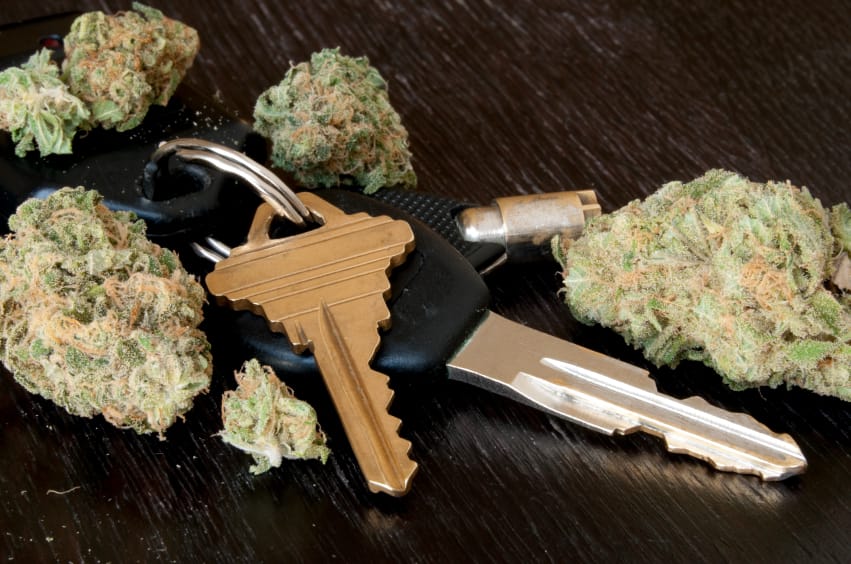
Each year, more states decriminalize and legalize marijuana. Marijuana possession laws in Pennsylvania have relaxed overall; possession is even decriminalized in some areas of the state- including State College.
Although marijuana is becoming more accepted in mainstream culture, it remains illegal to drive while under the influence. This poses a problem to police departments nationwide: how should we test for marijuana intoxication in drivers? In this edition of DUI Talk, we discuss the complications of applying alcohol intoxication testing to marijuana and consider what future marijuana intoxication testing devices may be like.
How Do Police Test for Marijuana Intoxication in PA?
Marijuana DUIs are treated much like alcohol DUIs in the state of Pennsylvania. The police officer must have probable cause for arresting you under suspicion of driving while under the influence of marijuana. That means that during the initial stop, the officer was able to gather enough objective, identifiable information to support your arrest- that may include odor, paraphernalia or marijuana possession, and/or failed roadside sobriety tests.
After you have been arrested, you will be taken to a facility to get your blood tested for delta-9-tetrahyrdocannabinol (THC). You have the right to refuse or consent to a blood test; however, be advised that refusing to consent to a blood test has serious consequences (see our previous blog post about Implied Consent). According to Pennsylvania Bulletin volume 34 issue 7, a THC level of 5 nanograms per milliliter or greater classifies a driver as under the influence of marijuana.
Blood testing for marijuana DUIs is standard procedure across the country; however, the practice is well disputed among the legal and scientific communities.
How Much Do You Have to Smoke to Test Positive?
This is where things get complicated: there is no answer to that question. Blood testing for alcohol consumption is widely agreed upon as an acceptable practice because of the way that ethanol dissolves in your body. Ethanol dissolves in water, so it dissolves at the same general rate from person to person. In addition, ethanol dissolves fairly quickly; therefore, the amount of ethanol is the blood is normally a direct reflect of its effect on the brain.
The body does not process THC quite as simply. Because THC dissolves in fat and not water, the length of time that the chemical is present in the body varies greatly from person to person. The duration is dependent on a variety of factors including body fat percentage, rate of use, gender, and how the marijuana was consumed.
Researchers have found that the presence and amount of THC in the blood tells us little about its effect on the brain. In one study, researchers found that chronic users tested at or above the 5 ng per mL level for multiple days after the participants stopped smoking marijuana. In another study, non-regular users tested negative for THC directly after smoking a joint.
These findings should be extremely disturbing to regular marijuana smokers. It is possible- even after abstaining from marijuana consumption for several days- that you could test above the 5 ng per mL limit for marijuana intoxication. In sum, you could get a marijuana DUI even when you are completely sober.
How is this Possible?
To be frank, this is possible because no better testing device exists that can accurately measure marijuana intoxication. With changing laws and evolving public perception, police departments are struggling to adhere to new standards while also keeping roadways safe from impaired drivers. Simply put, the blood test is the best resource that police have so that is what they use.
Do not stress too much- change does seem to be on the horizon. With states rapidly adopting legalization and medical marijuana policies, finding an accurate way to measure intoxication is a pressing issue. Scientists across the country are currently in the process of finding a more accurate and fair device.
According to the LA Times, the Dräger 5000 is a mouth swab device capable of detecting drug intoxication. The device is currently used by police in more than twelve states. Unfortunately, this device only detects intoxication- not the level of intoxication.
Breath tests seem to be the future of marijuana intoxication testing. Researchers hope to develop a breath test which can detect metabolites, the presence of which shows that marijuana has actually gone through your system. Testing for this reduces the possibility that someone who has merely been around others smoking marijuana will test positive. Additionally, this type of test will be more indicative of the effect on the brain.
For now, marijuana users must be extremely cautious. Never drive while under the influence of marijuana; not only are you giving officers more probable cause for your arrest, you pose a significant threat to yourself and other motorists. Do not carry marijuana or paraphernalia with you in your vehicle. Do not consent to a search of your car. Do not allow your passengers to smoke marijuana in your vehicle.
If you or a loved one has been arrested for driving under the influence of alcohol or marijuana, call our attorneys at Rehmeyer & Allatt for a free consultation: 814-343-9860.
If you would like to see blood testing for marijuana intoxication in action, watch this video produced by Washington state’s Koin 6:more about DUIs with our DUI Talk series:
The HGN Test
The Breathalyzer
Request for Admissions
